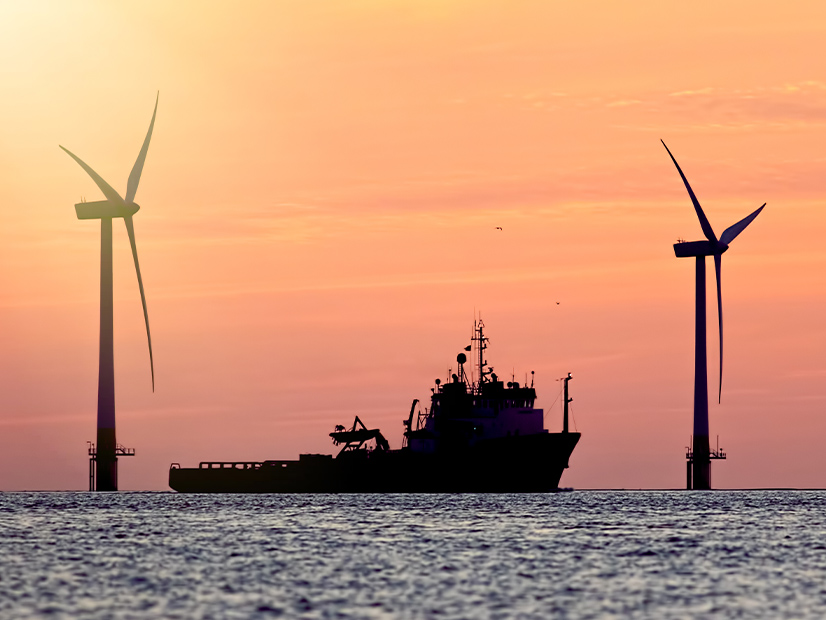Vineyard Offshore no longer plans to proceed with its bid for the 1,200-MW Vineyard Wind 2 project following Connecticut’s decision not to buy power from the project, the company said Dec. 20.
The news is a setback for Massachusetts’ efforts to scale up an offshore wind industry in the region. The state selected up to 800 MW from the project in its coordinated procurement with Connecticut and Rhode Island and had called on Connecticut or another other state or entity to pick up the remaining 400 MW. (See Multistate Offshore Wind Solicitation Lands 2,878 MW for Mass., RI.)
Massachusetts and Connecticut had discussed a deal for Massachusetts to buy some of the power from the Millstone Nuclear Power Plant — which is under contract with Connecticut — in exchange for Connecticut buying power from Vineyard Wind 2.
But Massachusetts proved to be unsuccessful at enticing any other bidders to procure power from the Vineyard Wind 2 project. Connecticut announced Dec. 20 its plans to select 518 MW of solar and 200 MW of battery storage from procurements administered in 2024, along with the closure of its offshore wind solicitation.
“With Connecticut’s decision today not to purchase the remaining 400 MW we are unable to contract the project’s full 1,200 MW at this time,” Vineyard Offshore wrote in a statement. “We look forward to advancing this project and participating in future solicitations to meet the region’s growing energy needs while spurring economic investment and creating thousands of American energy jobs.”
The bid cancellation leaves 2,078 MW of capacity still in play from the multistate solicitation; in September, Massachusetts selected 791 MW from Avangrid’s New England Wind 1 project and 1,087 MW from the SouthCoast Wind project, with Rhode Island selecting the remaining 200 MW from SouthCoast.
The states’ electric distribution companies still are negotiating the contracts for the two remaining projects. In November, Massachusetts electric utilities delayed the target date for finalizing the contracts from Nov. 8 to Jan. 15, with the contracts due to be submitted to the Massachusetts Department of Public Utilities by Feb. 25 (DPU 23-42).
The bids for the multistate solicitation likely will feature a major price jump compared to the first wave of offshore wind projects in the Northeast.
The best recent price comparison likely comes from the Sunrise Wind and Empire Wind projects, which agreed to contracts with New York in June with a $150.15/MWh rate. (See Empire, Sunrise Wind Back Under Contract in NY.) The 800-MW Vineyard Wind project, which was selected by Massachusetts in a 2017 solicitation and is under construction, has an average annual cost of $89/MWh (DPU 18-76, et al.).
Vineyard Offshore likely will have the opportunity to rebid Vineyard Wind 2 in 2025; Massachusetts passed a law in November authorizing multistate clean energy procurements through 2025, and state Energy Secretary Rebecca Tepper said at an event in December that her office’s statute “contemplates us doing another procurement in 2025.” (See Overheard at Raab Electricity Restructuring Roundtable: Dec. 13, 2024.)
However, a new procurement alone will not solve the underlying cost issues facing New England’s offshore wind industry.
Beyond Vineyard Wind 1, neither Avangrid’s 1,080-MW New England Wind 2 project nor Ørsted’s 1,184-MW Starboard Wind were selected in the multistate solicitation, despite the authorization for procurements of up to 6,000 MW across the three states.
In shying away from an offshore wind procurement, Connecticut may have found more value in onshore projects. It selected three solar projects and a 200-MW battery project. Two of the solar projects will be located in Maine and one in Connecticut. The storage project will be sited on “an abandoned brownfield” in the state, the Department of Energy and Environmental Protection said.
“Growing and diversifying our energy supply, especially our supply of low-carbon sources of energy, is the key to bringing down the cost of electricity for Connecticut ratepayers,” said Gov. Ned Lamont (D). “These investments will also ensure we have a reliable and green grid that helps us meet demand now and well into the future.”
SouthCoast Wind Gets Federal Approval
Offshore wind advocates did receive some good news Dec. 20, with the Biden administration announcing its approval of SouthCoast Wind, the administration’s 11th offshore wind project approval to date. The administration authorized up to 2.4 GW of generation from the project. (See SouthCoast Wind Nears Federal Approval with FEIS Release.)
“As we mark this achievement, we look forward to the meaningful economic opportunities the SouthCoast Wind Project will bring to this region, both during construction and throughout the project’s lifetime,” said Bureau of Ocean Energy Management Director Elizabeth Klein.
SouthCoast canceled prior contracts with Massachusetts in 2023 due to rising project costs. Its bid for the multistate procurement indicated it would begin construction in 2025 and come online by 2030.




